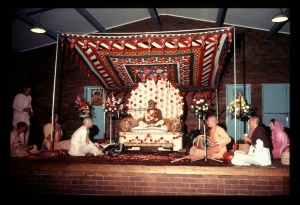SB 9.6.2: Difference between revisions
m (1 revision(s)) |
(Vanibot #0054 edit - transform synonyms into clickable links, which search similar occurrences) |
||
| (One intermediate revision by one other user not shown) | |||
| Line 1: | Line 1: | ||
{{info | {{info | ||
|speaker= | |speaker=Śukadeva Gosvāmī | ||
|listener=King | |listener=King Parīkṣit | ||
}} | }} | ||
[[Category:Srimad-Bhagavatam - Canto 09 Chapter 06|s02 ]] | |||
[[Category:Bhagavatam Verses Spoken by Sukadeva Gosvami - Vanisource|090602]] | |||
<div style="float:left">'''[[Srimad-Bhagavatam]] - [[SB 9|Ninth Canto]] - [[SB 9.6: The Downfall of Saubhari Muni|Chapter 6: The Downfall of Saubhari Muni]]'''</div> | |||
<div style="float:right">[[File:Go-previous.png|link=SB 9.6.1]] '''[[SB 9.6.1]] - [[SB 9.6.3]]''' [[File:Go-next.png|link=SB 9.6.3]]</div> | |||
{{RandomImage}} | |||
==== TEXT 2 ==== | ==== TEXT 2 ==== | ||
<div | <div class="verse"> | ||
rathītarasyāprajasya | :rathītarasyāprajasya | ||
bhāryāyāṁ tantave 'rthitaḥ | :bhāryāyāṁ tantave 'rthitaḥ | ||
aṅgirā janayām āsa | :aṅgirā janayām āsa | ||
brahma-varcasvinaḥ sutān | :brahma-varcasvinaḥ sutān | ||
</div> | </div> | ||
| Line 17: | Line 22: | ||
==== SYNONYMS ==== | ==== SYNONYMS ==== | ||
<div | <div class="synonyms"> | ||
''[//vanipedia.org/wiki/Special:VaniSearch?s=rathītarasya&tab=syno_o&ds=1 rathītarasya]'' — of Rathītara; ''[//vanipedia.org/wiki/Special:VaniSearch?s=aprajasya&tab=syno_o&ds=1 aprajasya]'' — who had no sons; ''[//vanipedia.org/wiki/Special:VaniSearch?s=bhāryāyām&tab=syno_o&ds=1 bhāryāyām]'' — unto his wife; ''[//vanipedia.org/wiki/Special:VaniSearch?s=tantave&tab=syno_o&ds=1 tantave]'' — for increasing offspring; ''[//vanipedia.org/wiki/Special:VaniSearch?s=arthitaḥ&tab=syno_o&ds=1 arthitaḥ]'' — being requested; ''[//vanipedia.org/wiki/Special:VaniSearch?s=aṅgirāḥ&tab=syno_o&ds=1 aṅgirāḥ]'' — the great sage Aṅgirā; ''[//vanipedia.org/wiki/Special:VaniSearch?s=janayām&tab=syno_o&ds=1 janayām] [//vanipedia.org/wiki/Special:VaniSearch?s=āsa&tab=syno_o&ds=1 āsa]'' — caused to take birth; ''[//vanipedia.org/wiki/Special:VaniSearch?s=brahma&tab=syno_o&ds=1 brahma]-[//vanipedia.org/wiki/Special:VaniSearch?s=varcasvinaḥ&tab=syno_o&ds=1 varcasvinaḥ]'' — who had brahminical qualities; ''[//vanipedia.org/wiki/Special:VaniSearch?s=sutān&tab=syno_o&ds=1 sutān]'' — sons. | |||
</div> | </div> | ||
| Line 24: | Line 29: | ||
==== TRANSLATION ==== | ==== TRANSLATION ==== | ||
<div | <div class="translation"> | ||
Rathītara had no sons, and therefore he requested the great sage Aṅgirā to beget sons for him. Because of this request, Aṅgirā begot sons in the womb of Rathītara's wife. All these sons were born with brahminical prowess. | Rathītara had no sons, and therefore he requested the great sage Aṅgirā to beget sons for him. Because of this request, Aṅgirā begot sons in the womb of Rathītara's wife. All these sons were born with brahminical prowess. | ||
</div> | </div> | ||
| Line 31: | Line 36: | ||
==== PURPORT ==== | ==== PURPORT ==== | ||
<div | <div class="purport"> | ||
In the Vedic age a man was sometimes called upon to beget sons in the womb of a lesser man's wife for the sake of better progeny. In such an instance, the woman is compared to an agricultural field. A person possessing an agricultural field may employ another person to produce food grains from it, but because the grains are produced from the land, they are considered the property of the owner of the land. Similarly, a woman was sometimes allowed to be impregnated by someone other than her husband, but the sons born of her would then become her husband's sons. Such sons were called kṣetra jāta. Because Rathītara had no sons, he took advantage of this method. | In the Vedic age a man was sometimes called upon to beget sons in the womb of a lesser man's wife for the sake of better progeny. In such an instance, the woman is compared to an agricultural field. A person possessing an agricultural field may employ another person to produce food grains from it, but because the grains are produced from the land, they are considered the property of the owner of the land. Similarly, a woman was sometimes allowed to be impregnated by someone other than her husband, but the sons born of her would then become her husband's sons. Such sons were called ''kṣetra jāta''. Because Rathītara had no sons, he took advantage of this method. | ||
</div> | </div> | ||
__NOTOC__ | |||
<div style="float:right; clear:both;">[[File:Go-previous.png|link=SB 9.6.1]] '''[[SB 9.6.1]] - [[SB 9.6.3]]''' [[File:Go-next.png|link=SB 9.6.3]]</div> | |||
__NOTOC__ | |||
__NOEDITSECTION__ | |||
Latest revision as of 16:12, 19 February 2024

A.C. Bhaktivedanta Swami Prabhupada
TEXT 2
- rathītarasyāprajasya
- bhāryāyāṁ tantave 'rthitaḥ
- aṅgirā janayām āsa
- brahma-varcasvinaḥ sutān
SYNONYMS
rathītarasya — of Rathītara; aprajasya — who had no sons; bhāryāyām — unto his wife; tantave — for increasing offspring; arthitaḥ — being requested; aṅgirāḥ — the great sage Aṅgirā; janayām āsa — caused to take birth; brahma-varcasvinaḥ — who had brahminical qualities; sutān — sons.
TRANSLATION
Rathītara had no sons, and therefore he requested the great sage Aṅgirā to beget sons for him. Because of this request, Aṅgirā begot sons in the womb of Rathītara's wife. All these sons were born with brahminical prowess.
PURPORT
In the Vedic age a man was sometimes called upon to beget sons in the womb of a lesser man's wife for the sake of better progeny. In such an instance, the woman is compared to an agricultural field. A person possessing an agricultural field may employ another person to produce food grains from it, but because the grains are produced from the land, they are considered the property of the owner of the land. Similarly, a woman was sometimes allowed to be impregnated by someone other than her husband, but the sons born of her would then become her husband's sons. Such sons were called kṣetra jāta. Because Rathītara had no sons, he took advantage of this method.